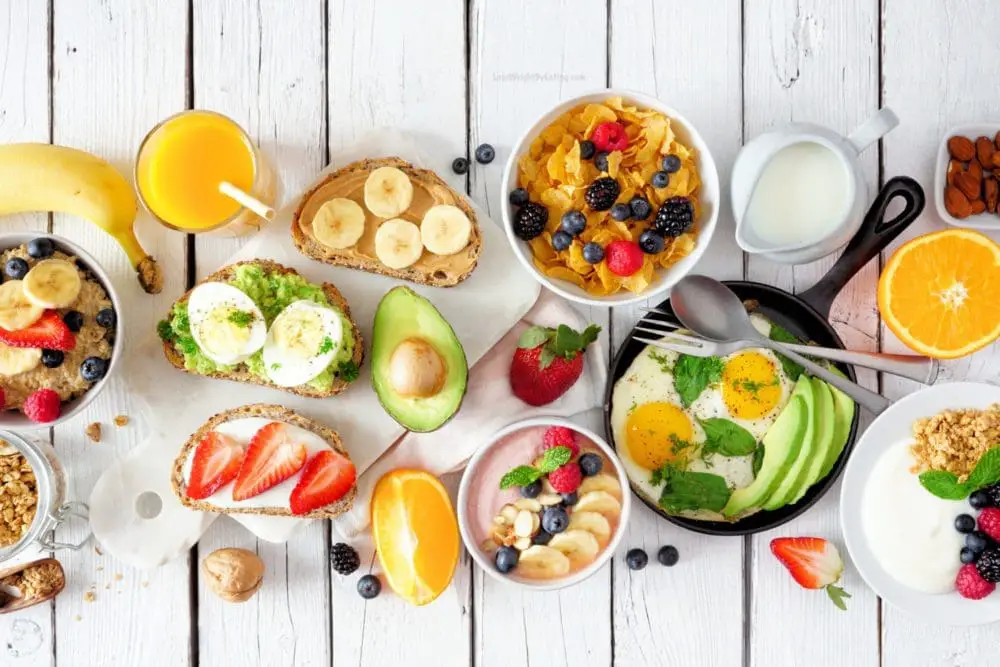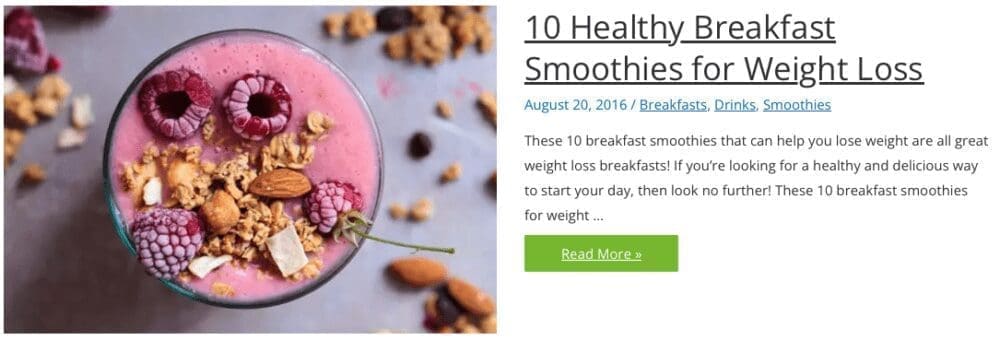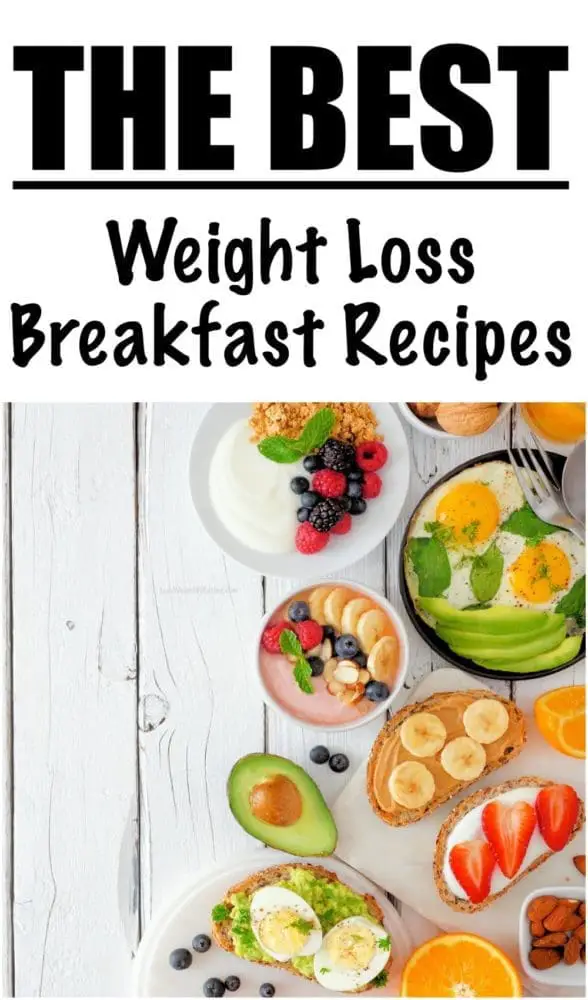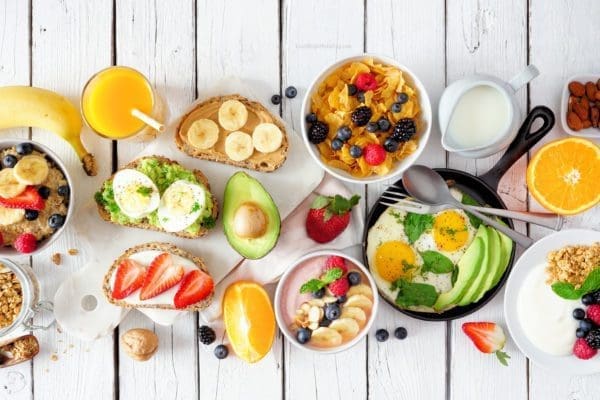These Healthy Breakfast Ideas for Weight Loss are all low in calorie and great for boosting weight loss! At Lose Weight By Eating, we understand the importance of starting your day with a healthy and nutritious breakfast. It sets the tone for the rest of the day and can even aid in weight loss efforts.


Eggs: The Perfect Protein
Eggs are a staple in many breakfast routines and for good reason. They are packed with high-quality protein and essential nutrients, making them an ideal choice for weight loss. Not only do they keep you full and satisfied, but they also help regulate blood sugar levels.
Some delicious ways to prepare eggs for breakfast include:
- Scrambled with spinach, tomatoes, and feta cheese
- Over easy with avocado toast
- Baked in a muffin tin with spinach and mushrooms
You can find more egg recipes in the Healthy Breakfast Ideas for Weight Loss recipe card below!
Oatmeal: The Fiber Powerhouse
Oatmeal is a classic breakfast option that is both filling and nutritious. It’s high in fiber, which helps keep you feeling full and satisfied throughout the morning. Plus, it’s easy to customize with your favorite toppings.
Here are a few delicious oatmeal toppings to try:
- Sliced banana and almond butter
- Fresh berries and a drizzle of honey
- Chopped walnuts and cinnamon
Smoothie Bowls: The Nutrient-Dense Option
Smoothie bowls are a trendy breakfast option that are both delicious and nutrient-dense. They are typically made with a base of frozen fruit, such as bananas or berries, and blended with a liquid, such as almond milk or coconut water.
Try these smoothie bowl recipes:
- Berry Banana Smoothie Bowl: Blend 1 cup frozen mixed berries, 1 banana, and 1/2 cup almond milk. Top with granola, sliced banana, and chia seeds.
- Green Smoothie Bowl: Blend 1 cup spinach, 1/2 avocado, 1 banana, and 1/2 cup coconut water. Top with sliced kiwi, shredded coconut, and hemp seeds.
Greek Yogurt: The Probiotic Powerhouse
Greek yogurt is a creamy and delicious breakfast option that is high in protein and probiotics. Probiotics are beneficial bacteria that help support gut health, which is important for overall health and weight loss.
Some tasty ways to enjoy Greek yogurt for breakfast include:
- Greek Yogurt Parfait: Layer Greek yogurt, mixed berries, and granola in a glass for a delicious and nutritious breakfast treat.
- Greek Yogurt Bowl: Top Greek yogurt with sliced banana, chopped almonds, and a drizzle of honey.
You can find more Greek Yogurt Healthy Breakfast Ideas for Weight Loss in the recipe card below!
How much should you eat at breakfast if you’re trying to lose weight?
While it’s important to start your day with a healthy and nutritious breakfast, portion control is also crucial for weight loss. Eating too much, even if it’s healthy, can still result in weight gain. On the other hand, not eating enough can lead to overeating later in the day.
So, how much should you eat at breakfast if you’re trying to lose weight? The answer depends on a few factors, such as your age, gender, height, weight, and activity level. However, a general rule of thumb is to aim for a balanced breakfast that includes protein, healthy fats, and fiber, and to eat until you feel satisfied but not stuffed.
Here are some guidelines to follow:
- Protein: Aim for at least 20 grams of protein at breakfast, as it helps keep you full and satisfied throughout the morning. Good sources of protein include eggs, Greek yogurt, cottage cheese, and nut butter.
- Healthy Fats: Include a source of healthy fats, such as avocado, nuts, or seeds, as they also help keep you full and satisfied. Just be mindful of portion sizes, as they are high in calories.
- Fiber: Aim for at least 5 grams of fiber at breakfast, as it helps regulate blood sugar levels and keeps you feeling full. Good sources of fiber include fruits, vegetables, whole grains, and nuts.
When trying to lose weight, it’s important to eat a balanced breakfast that includes protein, healthy fats, and fiber, and to eat until you feel satisfied but not stuffed. By following these guidelines and incorporating the healthy breakfast ideas outlined in this guide, you can start your day off on the right foot and achieve your weight loss goals.
What are the best proteins to have for breakfast?
Protein is an essential nutrient that plays a crucial role in maintaining and building muscle mass, and it’s also a key component of a healthy breakfast. Including protein in your breakfast can help you feel full and satisfied throughout the morning, reduce cravings, and stabilize blood sugar levels. Here are some of the best protein sources to include in your breakfast:
- Eggs: Eggs are a versatile and nutrient-dense protein source that can be prepared in many different ways, such as boiled, poached, or scrambled. One large egg contains about 6 grams of protein, making it an excellent breakfast choice.
- Greek yogurt: Greek yogurt is another protein-rich breakfast option that also contains probiotics, which are beneficial for gut health. One cup of plain Greek yogurt contains about 20 grams of protein.
- Cottage cheese: Cottage cheese is a low-fat, high-protein option that can be enjoyed on its own or mixed with fruits or nuts. One cup of cottage cheese contains about 28 grams of protein.
- Protein powder: Protein powder is a convenient option for those who are short on time or need a portable breakfast option. Look for high-quality protein powders made from whey, casein, or pea protein. One scoop of protein powder typically contains 20-30 grams of protein.
Other protein sources to consider include nut butter, tofu, and lean meats such as turkey or chicken breast. When choosing protein sources, aim for whole, minimally processed options, and be mindful of added sugars and unhealthy fats.
Incorporating protein into your breakfast can help you feel full and satisfied throughout the morning and provide your body with the nutrients it needs to function at its best. By choosing from the list of protein sources outlined above, you can start your day off on the right foot and set yourself up for success.
What are the best fruits and vegetables to have for breakfast?
Fruits and vegetables are excellent sources of fiber, vitamins, and minerals that can help support overall health and wellness. Including fruits and vegetables in your breakfast can provide you with sustained energy throughout the morning and help you meet your daily recommended intake of these important nutrients. Here are some of the best fruits and vegetables to include in your breakfast:
- Berries: Berries are a nutrient-dense and low-sugar fruit that are rich in antioxidants and fiber. Some great berry options for breakfast include strawberries, blueberries, raspberries, and blackberries.
- Bananas: Bananas are a versatile and filling fruit that are high in potassium, which can help regulate blood pressure. They are also a good source of fiber and can be added to smoothies or enjoyed on their own.
- Avocado: Avocado is a nutrient-dense fruit that is high in healthy fats and fiber. It can be sliced and added to toast or smoothies for a creamy and satisfying breakfast option.
- Spinach: Spinach is a leafy green vegetable that is high in iron and other important nutrients. It can be added to omelets or smoothies for a nutrient boost.
- Tomatoes: Tomatoes are a low-calorie and nutrient-dense fruit that are high in vitamin C and lycopene, which has been linked to a reduced risk of certain cancers. They can be sliced and added to breakfast sandwiches or enjoyed on their own.
- Sweet Potatoes: Sweet potatoes are a root vegetable that are high in fiber and vitamin A. They can be roasted or baked and enjoyed as a savory breakfast option.
Other fruits and vegetables to consider include apples, oranges, grapefruit, kiwi, bell peppers, and mushrooms. When choosing fruits and vegetables, aim for a variety of colors and types to ensure you’re getting a wide range of nutrients.
Incorporating fruits and vegetables into your breakfast can help you meet your daily recommended intake of these important nutrients and provide you with sustained energy throughout the morning. By choosing from the list of options outlined above, you can start your day off on the right foot and give your body the nourishment it needs.
What are the best grains to have for breakfast?
Grains are an important source of carbohydrates, which provide energy to the body. When choosing grains for breakfast, it’s important to focus on whole grains, which are high in fiber, vitamins, and minerals. Here are some of the best grains to include in your breakfast:
- Oatmeal: Oatmeal is a classic breakfast grain that is high in fiber and protein. It’s also a good source of iron and zinc. You can make oatmeal on the stovetop or in the microwave, and add toppings like berries, nuts, and cinnamon for extra flavor and nutrition.
- Whole wheat bread: Whole wheat bread is a great source of fiber and protein, and can be used to make toast or breakfast sandwiches. Look for bread that is made with whole grains and minimal added sugars.
- Quinoa: Quinoa is a versatile grain that is high in protein and fiber. It’s also a good source of iron, magnesium, and phosphorus. Quinoa can be used in breakfast bowls or as a base for savory breakfast dishes.
- Brown rice: Brown rice is a nutritious grain that is high in fiber and protein. It’s also a good source of manganese and selenium. You can enjoy brown rice as a savory breakfast option or use it to make breakfast bowls or porridges.
- Buckwheat: Buckwheat is a gluten-free grain that is high in fiber and protein. It’s also a good source of magnesium and phosphorus. You can use buckwheat to make porridges or as a base for savory breakfast dishes.
Other whole grains to consider include barley, bulgur, millet, and whole grain pasta. When choosing grains for breakfast, aim for options that are minimally processed and contain little to no added sugars or artificial flavors.
Incorporating whole grains into your breakfast can provide you with sustained energy throughout the morning and help you meet your daily recommended intake of fiber and other important nutrients. By choosing from the list of options outlined above, you can give your body the nourishment it needs to start the day off right.
What are the best drinks to have at breakfast for weight loss?
Drinks can be an important part of your breakfast routine, and choosing the right ones can help support your weight loss goals. Here are some of the best drinks to have at breakfast for weight loss:
- Water: Drinking water first thing in the morning can help boost your metabolism and aid in weight loss. It also helps to keep you hydrated throughout the day.
- Green tea: Green tea is a great source of antioxidants and contains compounds that may help boost your metabolism and promote weight loss. You can enjoy green tea on its own or add a squeeze of lemon for extra flavor.
- Black coffee: Black coffee is a low-calorie drink that can help boost your metabolism and aid in weight loss. However, be mindful of adding sugar or cream to your coffee, as this can add unnecessary calories.
- Vegetable juice: Vegetable juices are a great way to get in some extra nutrients and support weight loss. Opt for juices that are low in sugar and made from fresh, whole vegetables. Adding a splash of lemon or ginger can help enhance the flavor.
- Protein shakes: Protein shakes can be a convenient and filling breakfast option that can help support weight loss. Look for shakes that are low in sugar and high in protein, and add in ingredients like spinach, berries, or nut butter for extra nutrients and flavor.
When choosing drinks for weight loss, it’s important to focus on options that are low in sugar and high in nutrients. Drinking water throughout the day can also help support weight loss by keeping you hydrated and helping to curb cravings. By incorporating some of the drinks listed above into your breakfast routine, you can support your weight loss goals and start the day off on the right foot.
How Many Calories Should I Have for Breakfast to Lose Weight?
The number of calories you should aim for at breakfast when trying to lose weight can vary depending on your individual needs and goals. However, a good rule of thumb is to aim for a breakfast that is around 300-400 calories.
It’s important to focus on nutrient-dense foods that will provide your body with the energy and nutrients it needs to function optimally throughout the day. This means choosing foods that are high in protein, fiber, and healthy fats, while also being mindful of portion sizes and total calorie intake.
Some examples of breakfast options that are around 300-400 calories include:
- Greek yogurt with berries and nuts (around 300 calories)
- Two scrambled eggs with whole grain toast and avocado (around 350 calories)
- Oatmeal with almond milk, banana, and peanut butter (around 400 calories)
- Smoothie made with protein powder, spinach, berries, and almond milk (around 300-350 calories)
Remember, the most important thing is to listen to your body and choose Healthy Breakfast Ideas for Weight Loss that will help you feel satisfied and energized throughout the morning. Experiment with different foods and portion sizes to find what works best for you and your weight loss goals.
Try These Healthy Breakfast Recipes:






Lose Weight By Eating Cookbooks:


Share These Healthy Breakfasts for Weight Loss:


Article History:
- Originally written and published on April 15, 2020 by Audrey Johns
- Updated on December 4, 2020 by Audrey Johns
- Updated on October 7, 2021 by Audrey Johns
- Updated on March 18, 2023 by Audrey Johns

This tasted absolutely amazing I actually added some arugula on top of the egg and I used Greek honey yogurt to mixing with my avocado which actually tasted amazing Love this Love this Love this
So glad you like the recipes!!
Awesome recipe. Easy. I never mixed salsa and yogurt but it was really good
Wife loved it